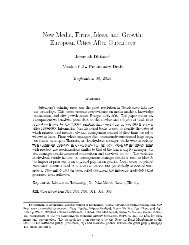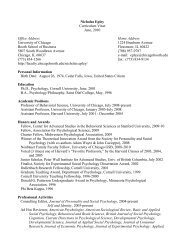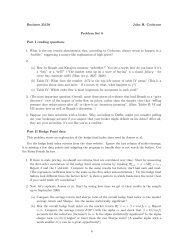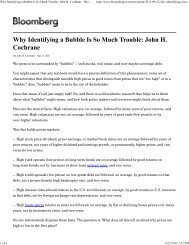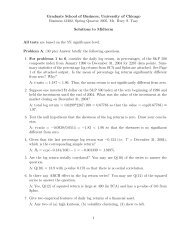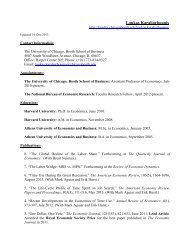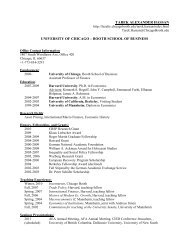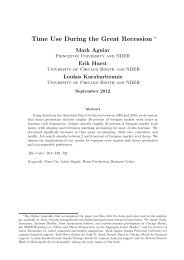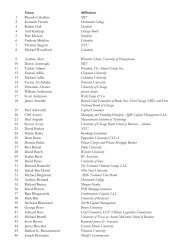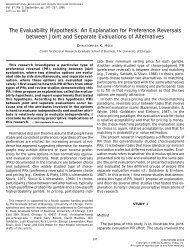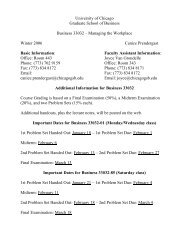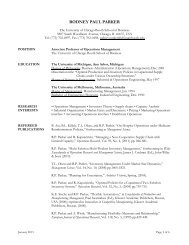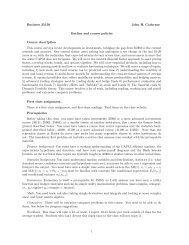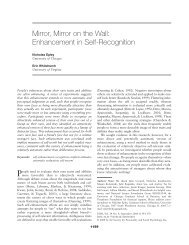Summaries of [Alleged] Corporate Fraud Cases - Faculty
Summaries of [Alleged] Corporate Fraud Cases - Faculty
Summaries of [Alleged] Corporate Fraud Cases - Faculty
Create successful ePaper yourself
Turn your PDF publications into a flip-book with our unique Google optimized e-Paper software.
eceivable--those bills still outstanding--jumped 30%, to $335 million. More troubling, the average time it took to actually<br />
get customers to fork over their cash steadily lurched upward in this period, from 109 days to 131. Prior to the merger, that<br />
figure for both Abbey and Homedco was better than the industry norm <strong>of</strong> around 100 days. Paine Webber analyst Helen<br />
O'Donnell notes, "Whenever you see receivables go up, the question arises, 'Are they collectible?'"<br />
Fortune Magazine<br />
31 March 1997<br />
Headline: HAVE THE URGE TO MERGE? YOU'D BETTER THINK TWICE EVEN MERGERS THAT SEEM<br />
BLESSED BY THE GODS CAN GO AWRY-- AS THE SAD TALE OF APRIA HEALTHCARE PROVES ALL<br />
TOO WELL.<br />
Byline: ERICK SCHONFELD<br />
16. Apria Healthcare<br />
03/02/1995 to 12/31/1998<br />
Whistleblower: Employee<br />
Apria branch manager Mark Parker informs the Justice Department <strong>of</strong> Apria's use <strong>of</strong> kickbacks payments to generate business<br />
eventually billed to Medicare. Apria settles this qui tam case with Parker and the DOJ for $2 million. Apria settles the class<br />
action suit, in combination with shareholders suit concerning Apria's poor control systems, for $42 million.<br />
“Parker filed his suit in August 1995, but because it was a whistle-blower suit, it was filed under seal while the Justice<br />
Department investigated the charges. The case remained under seal until this summer, when the U.S. Attorney's Office in<br />
Atlanta decided to intervene.”<br />
The Orange County Register<br />
October 1, 1996<br />
Headline: Apria accused <strong>of</strong> kickback scheme: Justice Department says the home health-care firm paid for referrals.<br />
Byline: Jay Greene<br />
17. Ascend Communications, Inc.<br />
11/05/1996 to 09/30/1997<br />
Whistleblower: Newspaper<br />
Following the announcement by Ascend forecasting its new product rollout in time to beat the competition, the San Francisco<br />
Chronicle publishes an article questioning Ascend's ability to meet the deadline with a workable product. During the<br />
implementation period, Ascend executives sell stock valued over $40 million and consummate a merger with Cascade<br />
Communication. The class period ends when Ascend releases earnings sharply below estimates due to significant product delays<br />
and glitches. Ascend settles the subsequent class action suit for $5.45 million.<br />
“Last Tuesday, Ascend announced that it would, indeed, start shipping its 56-k commercial modem in January.… Just one<br />
problem: The chips for the Ascend modem are being manufactured by Rockwell International. Last month Rockwell<br />
announced that samples <strong>of</strong> its 56-k chip would be available for "evaluation and pricing" in January. But actual shipments<br />
weren't expected until a few months later, perhaps as late as summer.”<br />
The San Francisco Chronicle<br />
November 7, 1996<br />
Headline: Is U.S. Robotics Going to Give Ascend a Run for Its Money? / Also, ever wonder what Micron's ex-CEO is<br />
up to?<br />
Byline: Herb Greenberg<br />
18. AT&T Corporation<br />
10/25/1999 to 05/01/2000<br />
Whistleblower: Firm<br />
AT&T fails to report that its core businesses -- long distance and business services -- are being hurt by wireless technology and<br />
by changes implemented at AT&T, particularly in reference to attrition resulting from a joint venture with Concert PLC. AT&T<br />
loses two large clients, an arm <strong>of</strong> the U.S. government and B.P., which trigger the release <strong>of</strong> revenue shortfall to the public in the<br />
earnings announcement process. In the class period, AT&T issues a $13 billion initial <strong>of</strong>fering <strong>of</strong> tracking stock on its wireless<br />
business. AT&T settles for $100 million.<br />
19. AT&T Corporation : AT&T Wireless Group Tracking Stock<br />
04/26/2000 to 05/01/2000<br />
Whistleblower: Newspaper<br />
Dyck, Morse and Zingales, Case summaries for “Who Blows the Whistle on <strong>Corporate</strong> <strong>Fraud</strong>?” Note page 1 disclaimer. Page 6


![Summaries of [Alleged] Corporate Fraud Cases - Faculty](https://img.yumpu.com/6552365/6/500x640/summaries-of-alleged-corporate-fraud-cases-faculty.jpg)
